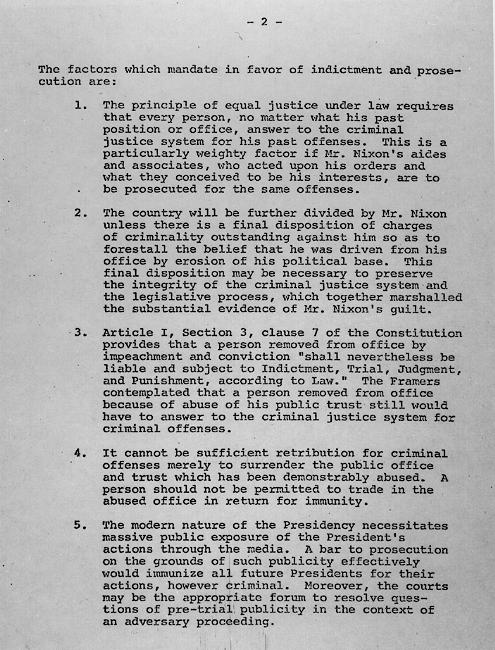
Watergate and the Constitution
Background
When Richard Nixon resigned in 1974 in the wake of the Watergate scandal, it was only the second time in our history that impeachment of a President had been considered. Nearly every action taken with regard to the case had some constitutional significance. The document shown here deals with a specific question: Should the Watergate Special Prosecutor seek an indictment of the former President?
It is two pages of a three-page memorandum written for the Watergate Special Prosecutor in August 1974, after Richard Nixon resigned the Presidency and before President Ford pardoned him. (The third page adds one more item to the pro-indictment list and adds another category, "delay decision.")
The Office of the Special Prosecutor was created by Executive Order in May 1973 and twice faced the question of whether to seek an indictment of Richard Nixon. The first time was in March 1974, when the grand jury handed down indictments of seven White House aides for perjury and obstruction of justice.
President Nixon was named an "unindicted coconspirator" at that time because Watergate Special Prosecutor Leon Jaworski advised the grand jury that in his opinion a sitting President could not be indicted. In his view, the House Judiciary Committee was the appropriate body under the Constitution for examining evidence relating to the President.
The House Judiciary Committee pursued its constitutional mandate and drew up five articles of impeachment, three of which they approved in the summer of 1974. When the President was forced by the Supreme Court in August 1974 to surrender tape recordings that revealed his knowledge of the cover-up, even his staunchest supporters in the House admitted that they would have to vote in favor of impeachment. On August 9, 1974, President Richard Nixon resigned the Presidency and became citizen Richard Nixon.
Thus, for the second time the Watergate Special Prosecutor's Office faced the question of whether or not to seek an indictment. Article I, section 3, clause 7 of the Constitution provides that a person removed from office by impeachment and conviction "shall nevertheless be liable to Indictment, Trial, Judgment and Punishment, according to the Law." But there are no guidelines in the Constitution about a President who has resigned. The memorandum shown here is typical of others in this file. It outlines reasons for and against pursuing an indictment against Richard Nixon. It is taken from Records Relating to Richard M. Nixon, Records of the Watergate Special Prosecution Force, Record Group 460.
The Document
Page 1
Page 2
View: Transcription
Article Citation
Gray, Leslie and Wynell Burroughs Schamel. "Constitutional Issues: Watergate and the Constitution." Social Education 51, 2 (February 1987): 88-90.

